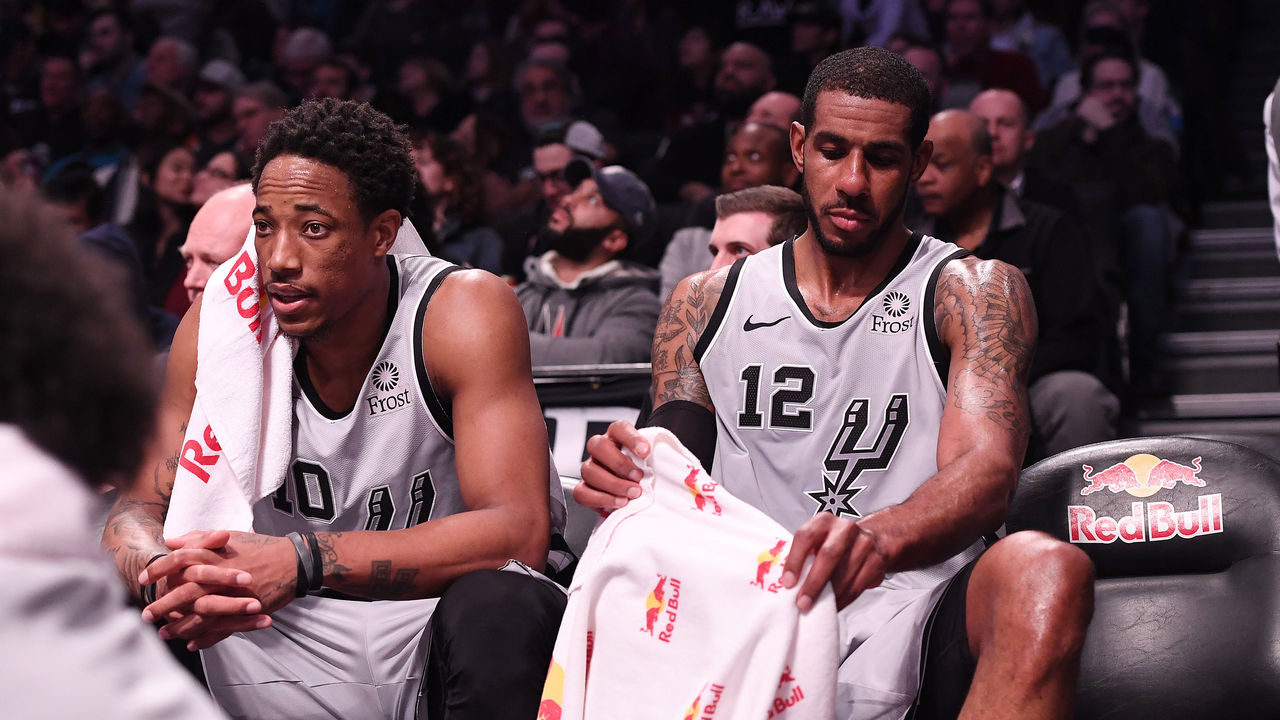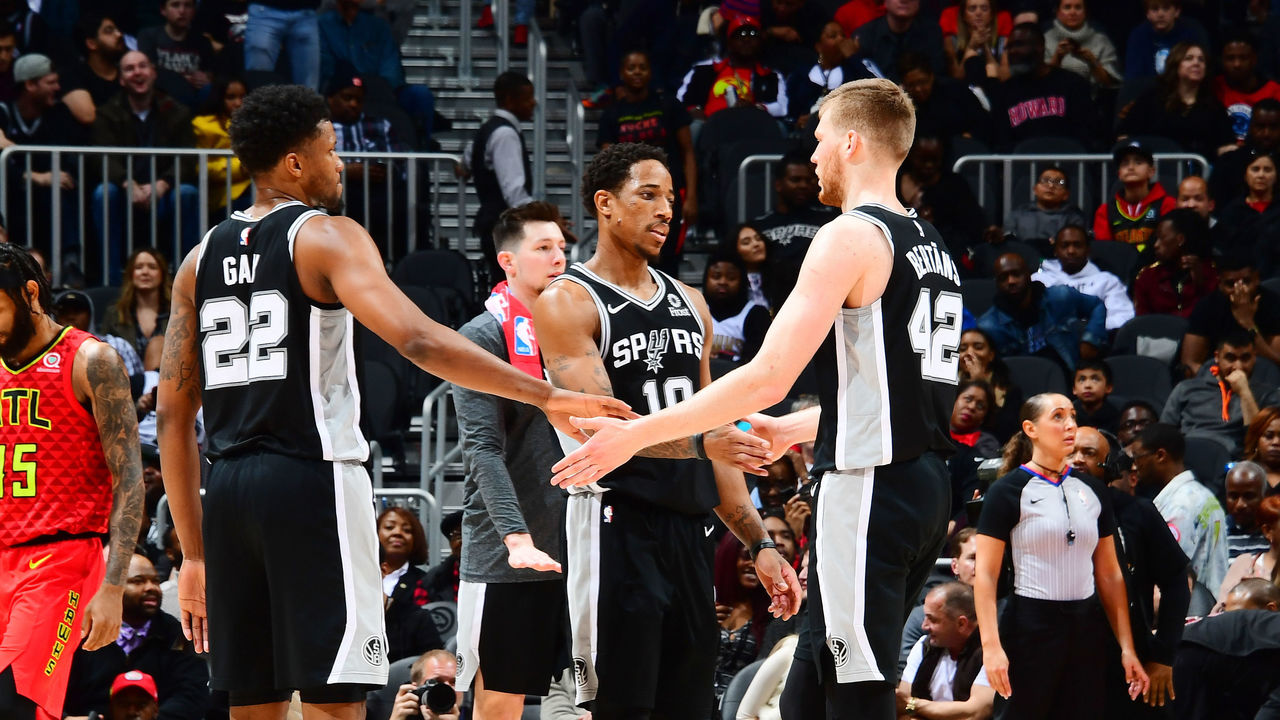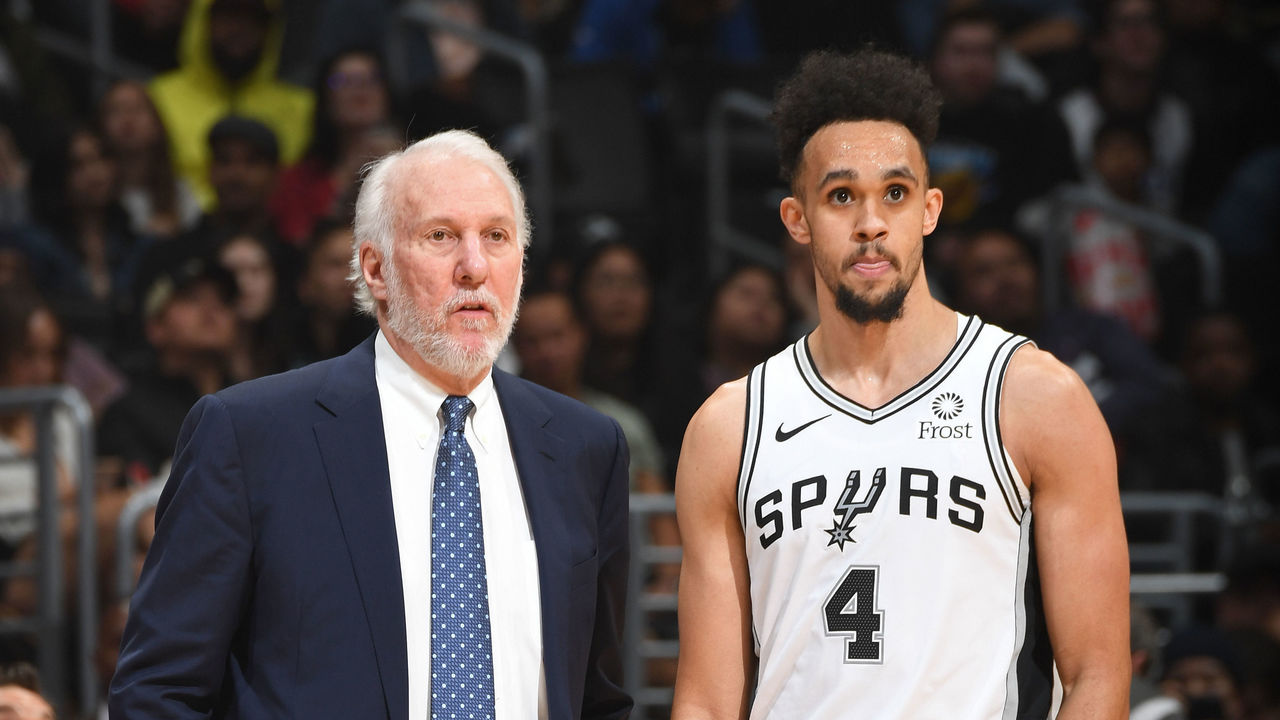Will the real San Antonio Spurs please stand up?
Seventy games into a season, we tend to have every team more or less figured out. The data paints a pretty clear picture of strengths and weaknesses, habits and core principles. We've sorted the contenders and pretenders, the tankers and treadmill teams, the dark horses and first-round fodder.
But every so often a team stubbornly resists categorization. And this season, no team has resisted it as strongly as the San Antonio Spurs.
This was always going to be a strange year in San Antonio. After being forced into trading Kawhi Leonard, the Spurs didn't have an MVP-caliber bedrock for the first time since they drafted David Robinson 30 years ago. Manu Ginobili retired, and Tony Parker signed with Charlotte. Coach Gregg Popovich lamented the loss of "corporate knowledge" as the last vestiges of his championship core filed out the door.
In the aftermath, the organization didn't commit to a particular direction, shirking a full-scale rebuild in order to stay competitive but lacking realistic championship upside. San Antonio tried to thread the needle between short-term relevance and long-term development, but then Dejounte Murray, the team's most promising young player, tore the ACL in his right knee during a preseason game.
Despite the upheaval and the murky expectations, this Spurs season has confounded. They started strong, then sputtered, then rebounded, then backslid, then pulled themselves out of the muck again. One month they look like a defensive bulwark, the next like a row of turnstiles. Through their first 25 games, they had the league's 29th-ranked defensive rating. Over their next 25, that same defense ranked fifth. Over the 12-game stretch that followed, which included their catastrophic 1-7 Rodeo Road Trip, they ranked last. In the 10 games since, they're back up to fourth. No other team with a roster that's remained intact has experienced such parabolic swings.

Coming out of the rodeo trip, the Spurs were clinging to eighth in the Western Conference. Their 21-year playoff streak seemed to be in peril. After reeling off nine straight wins plus a loss to Miami, they're in a logjam of four 42-30 teams holding fifth through eighth place that's basically eliminated the chasers. During their latest surge, they've beaten a handful of the league's best teams, including the Bucks, Warriors, Thunder, Nuggets, and Trail Blazers. But their record against winning teams (20-16, fourth-best in the league) is not that far off their record against those below .500 (22-14).
Equally mystifying is the Spurs' dependence on their home gym. They're 29-8 in San Antonio, the second-best home record in the West, but just 13-22 on the road, which is the worst mark for any current playoff team in either conference. It's a carry-over trend from last season - but this time, the defense rather than the offense is suffering away from the AT&T Center, allowing nearly nine more points per 100 possessions. Such a dramatic split is hard to explain. This isn't Denver or Utah, where the altitude offers a distinct advantage. Maybe it's the bats.
The sporadic results aren't the only things that make the Spurs a cipher. Their on-court identity, to the extent that one exists, lacks consistency in both function and form. Save for a few hallmarks of every Pop-coached team - a preternatural ability to defend without fouling, an allergy to offensive rebounds - this iteration bears little resemblance to Spurs teams of the recent past.
Offensively, they don't exactly play the Beautiful Game we grew accustomed to seeing from them in the first half of this decade. San Antonio ranks 27th in the league in passes per game after finishing in the top 10 each of the past five years (and top five in four of them). The team is 24th in frequency of plays finished by cutters, 22nd in plays finished via off-ball screening actions, and last in frequency of transition possessions, per NBA.com.
Without a traditional point guard, they subsist largely on LaMarcus Aldridge post-ups, DeMar DeRozan isolations, and a sprinkling of high pick-and-roll plays. When those two hit the bench, though, the shape of the offense starts to change. There's more movement, less dribbling, and more 3-point hunting. There are weaves and ball reversals and a parade of drive-kick-swings. Patty Mills flies off pin-downs, Marco Belinelli takes dribble-handoffs and launches on sight, Davis Bertans zips around non-stop and hits every single jumper he takes (that's barely an exaggeration; he's canned 59.5 percent of his threes from the corners). Their transitional lineups create a mish-mash of those two styles, though the high-usage guys naturally tend to win out.

The bench's brand of basketball hews closer to the typical Spurs ideal (and the team has rated far better with those guys on the floor), but the whole apparatus works. The offense has been in the top seven for most of the season. The Spurs are second in the league in field-goal percentage, first in 3-point percentage, and first in turnover rate.
We've seen plenty of Popovichian voodoo this season, but it also seems like he's made more of an effort to loosen his grip on the wand. He's tried not to overcoach after a bumpy start to his working relationship with Aldridge last season. Popovich's greatest skill is his adaptability, and he's encouraged his players to do what feels comfortable and leave the rest to him. That's how you get Aldridge operating out of the post more frequently than any player in the league, DeRozan completely abandoning the 3-point line, those two guys combining to shoot more mid-range jumpers than 15 teams, and the bench unit doing ... whatever it feels like. Popovich demands buy-in from his players, and in return, he's shown he's willing to buy into them.
That makes the Spurs look less reliant on the organizing principles that defined their past. But as a method for maximizing the talent on hand, it's hard to argue with the results. This year's Spurs have the best offensive rating in franchise history. Even with scoring trends up leaguewide, that's insane. Tim Duncan, David Robinson, Tony Parker, Manu Ginobili, and George Gervin - scrubs, all of them, when measured against the scoring prowess of Aldridge, DeRozan, Bertans, and Co.
As for the other end of the floor: If you examine the roster, their 20th-place ranking on defense sounds about right. This isn't a particularly fast or athletic team, it doesn't have much size on the wing, and without Murray, almost nobody had a history of high-end defensive play at the NBA level. The Spurs can put together stretches of inspired defense - mitigating their relative lack of quickness with communication, magnetic rotations, and timely backline help - but more often, they look overmatched, and a bit soft.
However, San Antonio is one of the best teams at preventing shots at the rim. That's thanks in large part to the pick-and-roll defense of young center Jakob Poeltl, whose combination of size, mobility, and smarts has given the Spurs a real lift. During the Spurs' recent hot streak, Rudy Gay moved to the bench so the team can start a supersized frontcourt with Aldridge and Poeltl. It's a look that has somehow worked out despite the fact that it puts three non-spacers in the starting lineup and leaves zero traditional big men on the bench. (Gay has also been great with the reserves; two years removed from a torn Achilles, he's shooting .510/.420/.831 and looking no worse for wear.)

Meanwhile, second-year guard Derrick White has been a revelation. After spending most of his rookie season in the G League, he's gamely handling the toughest perimeter assignment every night and providing some much-needed resistance at the point of attack. The Spurs' defensive rating with White on the floor would be good for fifth in the NBA. In 453 minutes with White and Poeltl out there together, they've allowed a paltry 100.2 points per 100 possessions, which would lead the league by a considerable margin.
So, who are the Spurs? Are they the team that's flummoxed quality opponents and defended at a borderline-elite level at home, or the one that's suffered repeated letdowns against inferior competition and gotten picked apart on the road? Down the stretch and in the playoffs, which of these teams will show up? They have identities stacked inside identities, like a nesting doll of basketball ideology and habit. You never quite know whether you've discovered the true center, or whether there's still another piece hiding within.
Something Steve Kerr said about the Warriors earlier this season could just as easily apply to San Antonio. "This is the real NBA," Kerr said. "We haven't been in the real NBA the last few years. We've been in this dream."
For more than two decades, the Spurs seemed to exist in their own dream universe - racking up 55-60 wins as a matter of course, sailing on the strength of their talent, continuity, and that corporate knowledge Popovich likes to tout. Now they're grinding away with everyone else, still trying to find their footing.
But they're making progress, and the stakes are pretty low anyway. They're not a young team, exactly, but the Spurs have a prime-aged veteran core and can look forward to Murray's return, another year of growth for White, and two first-round picks in the upcoming draft. Maybe the sun hasn't set on their empire just yet.
In the meantime, they're about to make the playoffs for a 22nd straight season. What they might accomplish in the postseason is a mystery, but when you're trying to rediscover who you are, you might as well go back to a place where you've always belonged.
HEADLINES
- Silver: NBA to consider granting Heat cap relief over Rozier scandal
- Kerr not concerned about Lacob's leaked email: 'We're all frustrated'
- VanVleet: Kawhi said he wouldn't stay with Raptors on Day 1
- Las Vegas, Seattle are front-runners if NBA expands to 32 teams
- Nuggets prevail as Jokic, Sengun exchange triple-doubles